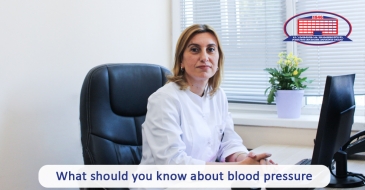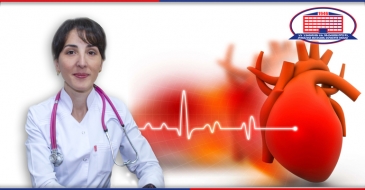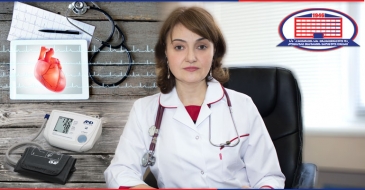Arterial hypertension, high blood pressure, “silent murderer” is not reveled till it causes damage to the body.
Arterial hypertension, high blood pressure is a risk factor for the development of heart, brain, kidney and vascular disease.
Arterial hypertension, as well as cardiovascular diseases, is characterized with seasonal inflammation. These periods are spring and autumn.
National Center of Surgery’s cardiologist and doctor of medicine, Lika Khosroshvili is here to discuss it with us.
– What is an arterial hypertension, high blood pressure?
– “blood pressure” in popular language and arterial hypertension in medical language is an increase of ‘upper’ and ‘lower’ blood’s i.e. systolic and diastolic blood pressure above the norm.
– Arterial hypertension is distinguished between two types. Please, tell us more about this.
– Yes, there are two types of arterial blood pressure: primary, essential, i.e. idiopathic hypertension that is reveled in 90-95% of the cases and secondary (symptomatic)that is connected to organ and systemic damages that directly influence arterial blood pressure level.
Classification of secondary arterial hypertension is following:
- Renal;
- Endrocrine;
- Neurogenic;
- Hemodynamic (cardiovascular, mechanical) and others.
In this case, etiologic and pathogenic factors removal causes the normalization of artertic blood pressure.
– What causes arterial hypertension?
– The reasons for hypertensive disease development are not fully established, but it is important to merge the hereditary predisposed condition with external factors’ undesirable influence such as excess weight, nervous stress, consumption of a large amount of table salt, alcohol, cigarettes, diabetes, cholesterol level increase in blood, etc.
– With what symptoms is hypertension manifested?
– Most frequently uncomplicated hypertension proceeds asymptomatically. The symptoms that accompany hypertension are following: headaches, ringing in ears, dizziness, general weakness, heart palpitations, respiratory difficulty, blurred vision, drowsiness, numbness of limbs. It is also often manifested by nose bleeding. With arterial hypertension, stroke, heart attack and heart failure cases have increased.
– Mainly what age group of people have high blood pressure complaints?
– People over 50 years old should be more attentive, due to the fact that arterial hypertension, high blood pressure manifests itself with high frequency from that age. Whereas, people below 30 years old may rarely have it.
Timely detection of symptoms and blood pressure regulation are of great importance, because with this exact way it’s possible to prevent life-threatening diseases, stroke and heart attack.
– How do you treat arterial hypertension in National Center of Surgery?
– In National Center of Surgery following recommended examinations are conducted before the antihypertensive treatment:
- EKG examination (electrocardiogram test)
- General urine test,
- Complete blood count;
- Coagulogram;
- Blood sugar level – on an empty stomach and 2 hours after the food intake.
- Potassium, creatinine and lipid spectrum’s determination in blood.
- Echocardiogram examination;
- If necessary, 24-hour holter monitoring and arterial blood pressure monitoring.
Based on conducted examinations, two or more antihypertensive drugs from various medication groups are prescribed in order to achieve desired arterial blood pressure level. In approximately 30% of the cases, it’s possible to control blood pressure numbers only with one medication. With antihypertensive medication (thiazide diuretics substances, ACE-inhibitors, beta blockers, calcium channel blockers, angiotensin II receptor blockers) treatments, not only do we regulate arterial blood pressure numbers, but simultaneously prevent cardiovascular diseases development.
– What is an indicator of normal blood pressure and what - hypertension?
– TA 119/79 mmHg is considered to be a norm.
It’s hypertension disease, when arterial blood pressure numbers are above 140/90 mmHg.
Nevertheless, in case of diabetes or chronic kidney failure arterial blood pressure indicator more than 130/80 mmHg is considered a hypertension.
National Center of Surgery address: Tbilisi, Dighomi, Chachava N5..
You may contact National Center of Surgery’s call center at 577 119 119 or 2 02 25 25..
In case of any issues, you may contact National Center of Surgery’s cardiologist Lika Khosrolshvili for consultation at 577 37 33 35.
Wish you health!










